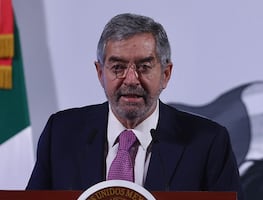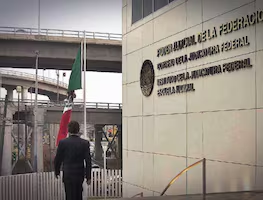Más Información

Trump desata una confrontación interna en México por declarar terroristas a los narcos; Sheinbaum acusa de “entreguismo” a oposición

Avanza repatriación a México de connacionales secuestrados por huitíes; reciben asistencia y protección consular
On December 24, Bolivia’s interim government accused Mexico of intervening on the country’s internal issues and rejected claims that Bolivian authorities tried to violate the Mexican ambassador ’s immunity by trying to stop and inspect her vehicle.
EL UNIVERSAL
obtained a copy of a letter Bolivia sent to the Inter-American Commission on Human Rights ( IACHR ), where Bolivia’s Foreign Ministry claims that it is worried about “Mexico’s interference with internal issues” and called the Mexican government to build a “constructive dialog.”
Since December 23, Mexico has reported the presence of Bolivian police officers outside the Mexican embassy in La Paz and outside the ambassador’s residence, something that Bolivia denies; however, Mexican diplomats have shared dozens of photographs that show police and military officers outside the residence and the embassy.
Bolivia
also argues that it deployed dozens of officers outside the Mexican embassy to offer protection :
“The increase in security was due to the need to protect the diplomatic residence , as a result of the information received by the government about serious violence threats made by social movements in the El Alto city and from the group called “ Ponchos Rojos ,” who were planning to march to the residence to demand the expulsion of Juan Ramón Quintana ,” who has been accused of being responsible for the fall of Evo Morales .
However, Mexico insists that Bolivia has contradicted itself several times. First, it claimed to be providing protection to the Mexican diplomats yet on a TV interview, a police chief said that they are outside the embassy to prevent the nine former officials from leaving Bolivia.
On December 26, Mexico announced it would appeal to the International Court of Justice to ensure that Bolivia respects the Mexican diplomatic facilities , following its decision to grant asylum to nine people.
Foreign Minister Marcelo Ebrard
said Mexico wanted the court, based in The Hague , to mediate in the dispute, which has sparked a conflict between both countries.
Ebrard
said Mexico had “good support” from the international community in its dispute with the new conservative government of Bolivia , which was not elected by popular vote.
Ebrard added that he expected the weight of international opinion to support Mexico, and likened the attitude taken by what he called the “de facto” Bolivian government to military-led regimes from Latin America in power during the 1970s .
A few hours ago, the Bolivian government issued a statement in regards to its relationship with Mexico and the situation outside the Mexican embassy in La Paz.
In the statement , Bolivia says that the relationship between both countries deteriorated when the Mexican government helped Evo Morales and added that “the government of Andrés Manuel López Obrador offered asylum to Evo Morales (…) and allowed Morals to make destabilizing political statements and even call for violence and the siege of the main cities in Bolivia, against international laws .”
In its letter, the Bolivian government emphasized that President López Obrador is “interfering with internal affairs ” in Bolivia.
Moreover, the Bolivian government confirmed that it wants the Mexican embassy to hand the 9 refugees over to Bolivian authorities yet “the Mexican government rejected” the petition to hand over those people and “ratified its decision to grant them asylum ” and defy the Bolivian jurisdiction.
In the letter, Bolivia also accuses the Mexican government of lying and showing “a scenario that doesn't exist” and of “ twisting and distorting ” the truth.
On Friday, Mexican President Andrés Manuel López Obrador said his country’s right to grant asylum must be respected, when asked about an ongoing spat with Bolivia over the South American country’s surveillance of the Mexican embassy there.
gm








